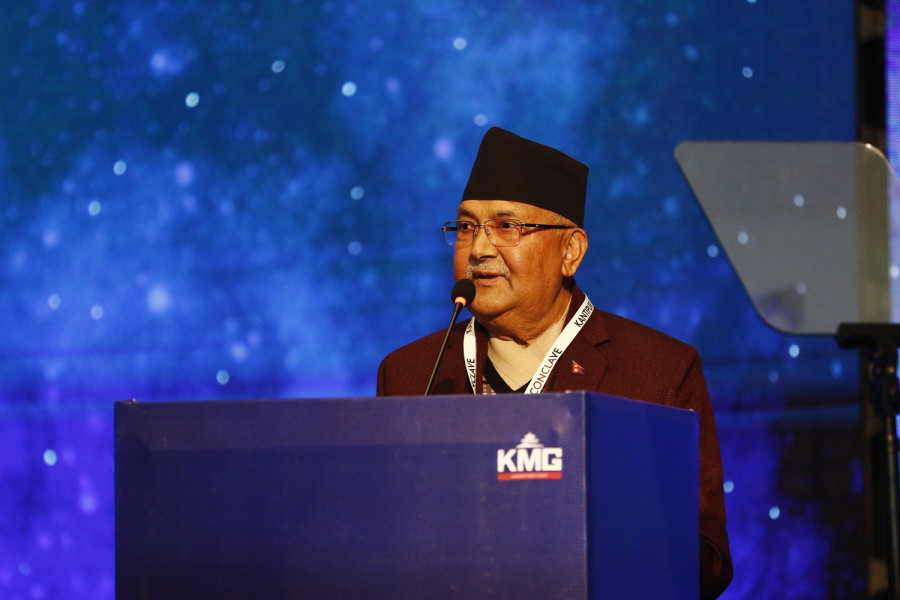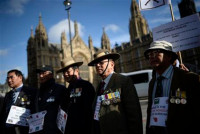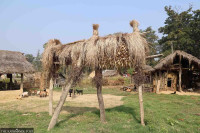National
Oli inaugurates Kantipur Conclave with focus on connectivity
Delivering keynote address, the prime minister listed the achievements of his two-year administration and outlined his plans for a prosperous Nepal.
Post Report
Prime Minister KP Sharma Oli on Friday listed his administration's accomplishments over the past two years and shared his vision for the coming years to achieve the goal of a prosperous Nepal with happy Nepalis.
Delivering a keynote address at the second edition of the Kantipur Conclave, Kantipur Media Group's flagship global event, Oli said that less than halfway through his tenure, his administration has been able to spark optimism.
After a landslide victory in the 2017 elections, Oli assumed office in February 2018, two years after his first stint as prime minister when he had attempted to diversify Nepal's connectivity with the northern neighbour in the wake of a months-long Indian border blockade.
In 2016, he signed a slew of deals with China, aiming to enhance connectivity and transit and transport to countervail Nepal's almost complete dependence on India.
Oli on Friday used the stage of the Kantipur Conclave, whose theme this year is 'Reimagining Connectivity’, to stress his administration's focus on connectivity.
“Connectivity has been the main thrust of our engagement with our neighbours,” said Oli. “We believe that multimodal connectivity with India and Trans-Himalayan Multidimensional Connectivity Network with China offer immense opportunity for our development and prosperity.”
Enumerating connectivity-related projects that Nepal is currently implementing, Oli said that landlocked Nepal would soon become linked via waterways and that Nepal’s flag carriers would soon be sailing the country’s big rivers.
“Motorboats will not only be fun of our life [sic], but also add value to our tourism,” Oli said. “Rail links with both of our neighbours will revolutionise our transportation system, providing much-needed boost to our economy. It will make Nepal truly a land-linked country.”
Under the broad thematic area of connectivity, the second iteration of Kantipur Conclave brings together personalities from across the world to speak on various issues of import, including lessons that Nepal can learn from East Asia, connecting global Nepalis and the #MeToo movement.
Following addresses by C Raja Mohan, director of the Institute of South Asian at the National University of Singapore; Bruno Macaes, senior fellow at the Hudson Institute; Andy Mok, senior research fellow at the Center for China and Globalization, Oli spoke broadly about the achievements of the past two years, reflecting on all that his administration had managed to get done.
The region’s first cross-border petroleum pipeline has come into operation and two international airports in Bhairahawa and Pokhara are expected to be completed soon. Oli said that his government has played a positive role in harnessing investment and creating a positive environment to bring investment for various infrastructure sectors.
“Private sector, entrepreneurs and individual innovators are the principal actors in this collective expedition. We are mindful of the government’s responsibility as a facilitator, enabler and provider of law and order and suitable, competitive atmosphere,” he said.
But Oli also called on the private sector to reciprocate the government’s actions and foster a “healthy, competitive economic environment where everyone has a fair chance to grow” and also “shun the tendency of rent-seeking and seeking short term benefits.”
Oli said that he expects the private sector to invest in productive sectors and adopt new technology to become competitive globally. Oli promised to support the private sector with legislation.
“My government is committed to easing and facilitating the entry of new players and start-ups in all productive sectors,” said Oli. “We have already started one window services for prospective investors. Company registration service is getting smoother; land acquisition is getting more simplified; cost of tax payment is reduced; and dispute settlement is reformed.”
Oli explicitly mentioned the indictment of 175 persons, including three former ministers, on corruption charges by the Commission for Investigation of Abuse of Authority as emblematic of his administration’s commitment to fighting corruption. It was actions like these that led to Nepal’s improvement on the global corruption index, he said.
Nepal moved up 11 places from 124 to 113 on Transparency International’s Corruption Perception Index.
At the end of his statement, Oli said that Nepal is “rich in ideas and knowledge; rich in natural and cultural resources; rich in demography; and has tremendous goodwill and support of the international community” while calling for support.
“What we need is a synergetic partnership among government, private sector and civil society to harness the tremendous potentials that we are endowed with,” he said.




 13.16°C Kathmandu
13.16°C Kathmandu














